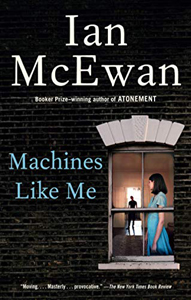 Ian McEwan, Machines Like Me: A Novel (New York: Doubleday, 2019), 333pp.
Ian McEwan, Machines Like Me: A Novel (New York: Doubleday, 2019), 333pp.
When the narrator of this novel inherits some family money, he stays true to character and blows it all on yet another crazy scheme — he buys an "artificial human" named Adam for about $100,000. Adam comes with a 410-page online manual, and Charlie and his girl friend Miranda must program his personality. There are about a dozen Adams in the world, complimented by a dozen Eves. Welcome to Ian McEwan's exploration of artificial intelligence and machine learning, complicated by several extended sub-plots.
Adam is either "the triumph of humanism — or its angel of death." Is Adam a "he" or an "it?" Sure, he can amass vast sums of knowledge, and respond to algorithms far beyond mere human capacity, but does he have sentience, and all the characteristics that we associate with consciousnesses (whatever that is) — desire, jealousy, loyalty, aging, morality, motivation, and more murky things like subjective feelings, "the purposeless beauty of art," or the joy of a child at play. "His mind fascinated me," says Charlie, "if a mind is what he had." Suffice it to say that Charlie and Miranda discover that an artificial human is "far more complicated than I had imagined."
McEwan's novel is partly a social commentary on technology, but even more so a philosophical inquiry about what it means to be human. He defines the discussion in the very first paragraph of the book: "It was religious learning granted hope, it was the holy grail of science. Our ambitions ran high and low — for a creation myth made real, for a monstrous act of self-love. As soon as it was feasible, we had no choice but to follow our desires and hang the consequences. In loftiest terms, we aimed to escape our mortality, confront or even replace the Godhead with a perfect self. More practically, we intended to devise an improved, more modern version of ourselves and exult in the joy of invention, the thrill of mastery. In the autumn of the twentieth century, it came about at last, the first step towards the fulfillment of an ancient dream, the beginning of the long lesson we would teach ourselves that however complicated we were, however faulty and difficult to describe in even our simplest actions and modes of being, we could be imitated and bettered. And I was there as a young man, an early and eager adopter in that chilly dawn."
Dan Clendenin: dan@journeywithjesus.net


